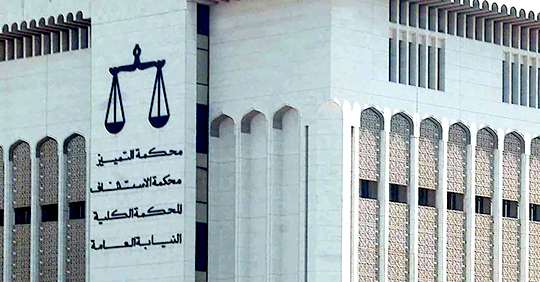
Cairo: 18 March, 2019
The Arabic Network for Human Rights Information (ANHRI) expresses its deep sorrow at the decision issued by the Kuwaiti Court of Cassation upholding the Interior Ministry’s decision to exclude citizen “Saleh Jarman” from the lists of candidates running for the supplementary elections of the Kuwaiti National Assembly, against the backdrop of a ruling previously handed down to him over a protest case.
Kuwait’s Court of Cassation ruled, on Thursday, 14 March 2019, that Saleh Jarman will be excluded from the lists of candidates running for the National Assembly’s supplementary elections. The court deemed the ruling previously issued against him, after being convicted of “taking part in an unauthorized protest and resisting an employee while carrying out his job”, to be “one of the crimes against honor and honesty”. The court, hence, pointed out that the suspended 2-year prison sentence it handed to Jarman in 2017 has made him not eligible to run for election since he doesn’t meet one of its legal requirements.
ANHRI’s sorrow and concern is further intensified by the emergence of some voices that try to magnify such erroneous logic given to justify the ruling. These voices call for depriving those who are accused of exercising the right to demonstrate of jobs and employment chances, leading the act of protesting to be considered as a crime rather than a right that is exercised in accordance with the International Covenant on Civil and Political Rights that Kuwait ratified many years ago.
ANHRI said: “We feel sorry that such a ruling was issued by the Court of Cassation which is supposed to establish the legal principles consolidating freedoms in the society. We believe that this ruling is vitiated once it violates freedom of expression and the international charters and conventions that have become part of the basic principles of human rights, and this is with the aim to put restrictions on the right to freedom of expression and the right to run for public office. Such restrictions have been frequently used by authorities to topple opponents”.
ANHRI added:” We would also like to draw attention to the fact that this is not the first time this court issue decisions that infringe on the right to freedom of opinion and expression and the right to peaceful assembly. It previously considered insulting the emir as a crime against honor and honesty, and ruled, on 24 November 2016, to ban candidates Badr Dahoum and Khalid Al-Nayef al-Mutair from running for the National Assembly elections, after considering their conviction for the alleged offence of insulting the emir one of the crimes against honor”.
The Arabic Network for Human Rights Information called on the Kuwaiti National Assembly to formulate clear definitions of the crimes that impede the right to vote or run for public office, while excluding opinion and publishing-related cases from the list as long as they don’t incite hatred or violence, so that citizens are not deprived of their right to vote or be elected because of an opinion or a stance taken.







